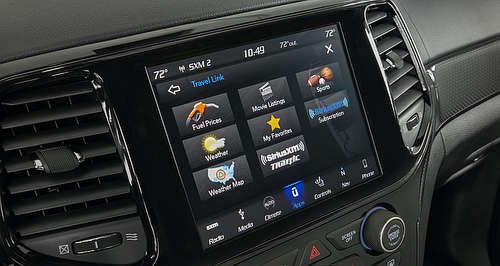Make / Model Search
News - General News - TechnologyStellantis’ in-car ads frustrate customersAD VENT: Jeep customers have vented their frustration at the appearance of in-car ads on popular models across the US. Full screen ads block functionality, ‘breach trust’ between vehicle owners and OEMs24 Feb 2025 By MATT BROGAN NORTH AMERICAN Chrysler, Dodge, Jeep, and Ram customers say they are frustrated by parent company Stellantis’ decision to introduce full-screen pop-up advertisements on its infotainment systems.
According to an article published by US outlet FutureTech this week, Jeep owners have reported intrusive advertisements for Mopar’s extended warranty appearing every time the vehicle comes to a stop, disrupting access to satellite navigation and other functions.
While some Jeep owners have investigated a work-around to the issue, including the potential installation of an aftermarket infotainment unit, others say the experience has promoted them to switch brands, potentially damaging Stellantis’ already precarious market position.
“If automakers continue prioritising profits over user experience, they may drive customers toward competitors that respect ownership rights,” said the FutureTech article.
Stellantis said the advertisements are attributed to a contract with satellite radio provider SiriusXM and suggests dismissing advertisements manually as they appear.
While the company claims to be working on reducing ad frequency, it is feared the move has already damaged customer trust.
The news follows a growing trend among manufacturers adding subscription-based features, similar to BMW charging for heated seats and in-built dash cams (a move it later reversed), and Mercedes-Benz locking performance boosts behind paywalls.
More common in-car subscription services include access to connected car services, usually via an owner’s mobile phone.
Brands including BMW, GWM, Lexus, Mazda, Nissan, Subaru, Toyota, and Volkswagen offer a range of connected car services, with subscriptions usually included free-of-charge within the warranty period.
But industry experts have warned that many connected car systems are not only a way for manufacturers to monetise vehicle ownership, but a security risk as well.
A recent article by Forbes suggests connected car services pose an unacceptable cybersecurity risk to the modern car owner, increasingly integrated technology and connectivity making vehicles and their owners more vulnerable to cybersecurity threats.
Noting a recent vulnerability in Subaru’s Starlink system, Forbes said consumers face a growing risk from connected car services, leading to privacy breaches, financial loss, and even physical danger.
“Security researchers recently discovered a major vulnerability in Subaru's Starlink service that could have allowed hackers to take control of vehicles and access sensitive customer data,” said the article.
“Using just a license plate and basic details like the owner's last name or email address, attackers could exploit the system in several alarming ways. They could remotely start or stop the car, lock and unlock its doors, and track the vehicle's real-time location.
“Additionally, they could extract personally identifiable information (PII), including emergency contacts, billing details, and the vehicle’s PIN.
“Perhaps most concerning, hackers could access precise location data spanning over a year, with accuracy within five meters, enabling them to build a detailed profile of the victim’s movements.”
The examples listed here are just a handful of those noted on an annual basis. Forbes says more must be done to protect vehicle owners from such vulnerabilities, saying such examples reveal systemic issues in the design and deployment of connect car services.
“Weak authentication makes it easier for attackers to break into sensitive systems,” the article continued.
“Centralised systems store large amounts of sensitive user and vehicle data, making breaches more likely (and) many connected car platforms do not encrypt data properly, leaving it vulnerable during transmission.
“(Further), poor integration with third-party apps and portals creates security gaps, with automakers often taking too long to find and fix vulnerabilities, leaving vehicles exposed for longer than necessary.”  Read more3rd of April 2024  BMW, Tata join forces on software developmentJoint venture between BMW and Tata to establish software, IT development hubs across India11th of January 2024  CES: Twinning tech a winning strategyDigital twinning allows earlier design collaborations, faster in-car technology roll-out17th of January 2023  Hyundai Tucson scores Bluelink telematicsTucson continues Hyundai’s rollout of Bluelink connected car services for MY2023 |
Click to shareGeneral News articlesResearch General News Motor industry news |











Facebook Twitter Instagram